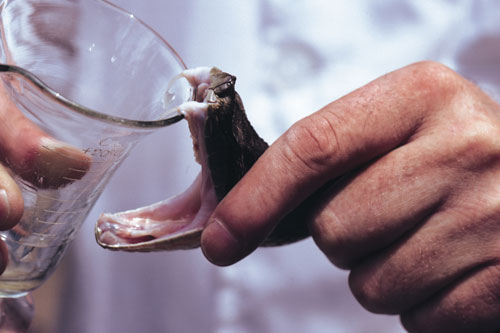Hong Kong university study details use of viper venom to shrink colorectal cancers.
A protein in the venom of the sharp-nosed viper has shown in tests to shrink the size of colorectal tumors in mice by 28 percent in a month, according to a news release detailing a six month study at Hong Kong Baptist University. Researchers at the university were awarded HK$3.9 million in funding by Hong Kong’s Innovation and Technology Fund and Lee’s Pharmaceutical to further its study of using snake venom proteins to develop anti-cancer and anti-angiogenic drugs. The research team is led by Professor Wendy Hsiao, Associate Dean of the School of Chinese Medicine at Hong Kong Baptist University.

Thinkstock
Initial tests on a protein taken from the venom of the sharp-nosed viper have shown it can reduce the size of colorectal tumors in mice by up to 28 per cent within a month.
Initial tests on a protein taken from the venom of the sharp-nosed viper have shown it can reduce the size of colorectal tumors in mice by up to 28 per cent within a month.
According to the release, tumor growth is fed by blood vessels until the tumor reaches a size that can no longer be supported by the blood vessels that feed it. The tumor then releases angiogenic growth factors that promote the growth of the tumor. The protein in the snake venom of the sharp nosed viper, called ZK002, has shown in tests on mice with colorectal cancers that it has the capability to inhibit the growth of these angiogenic growth factors.
The study showed observable shrinkage of the colonic tumors in 18 mice as well as improvements in hematocrit (concentration of red blood cells in blood) values with no changes in the weight of the mice and no outward adverse effects. The long term goal of the research team is to produce a low cost anti-cancer drug using snake venom that
has high effectiveness and minimal adverse effects on healthy cells.


